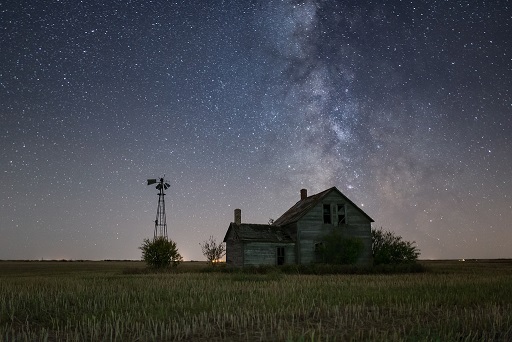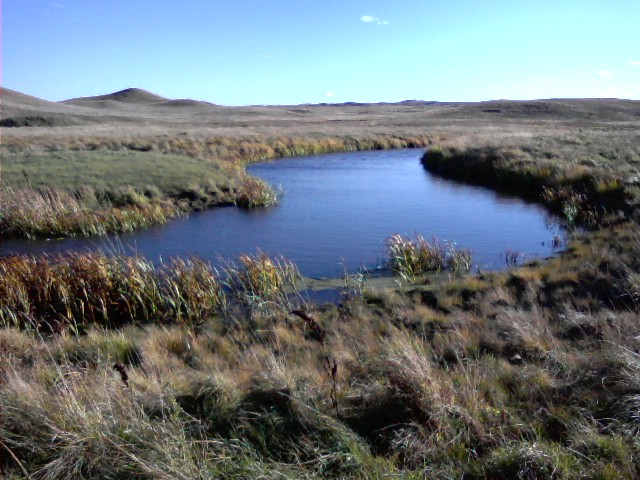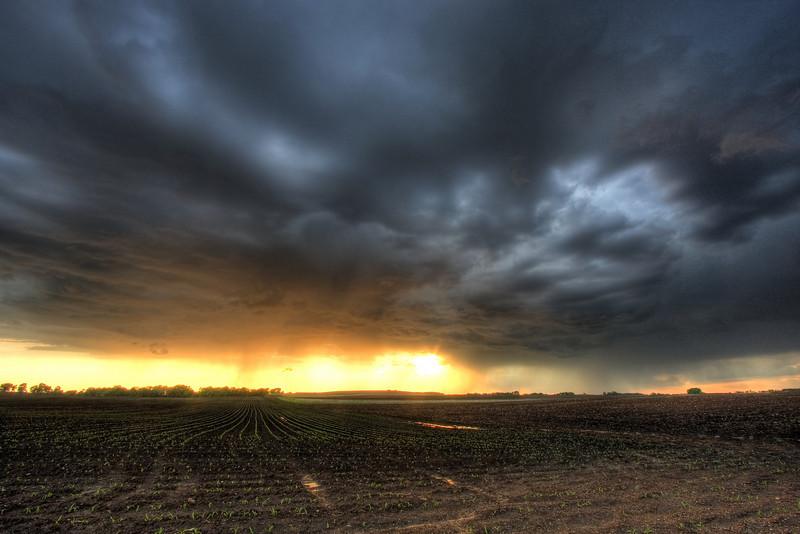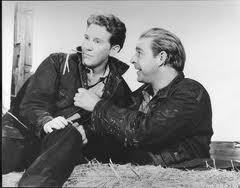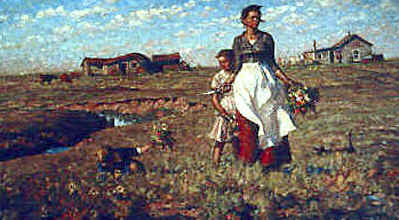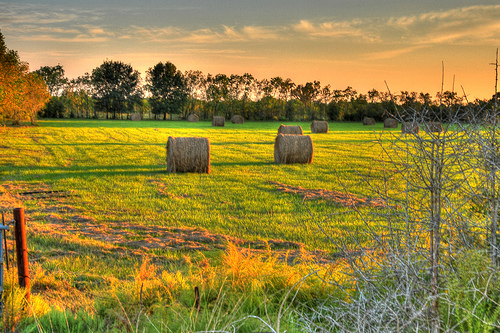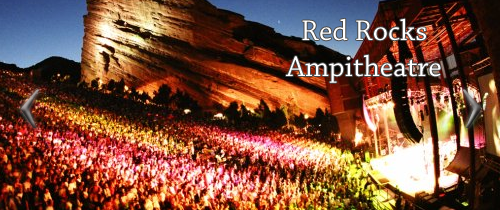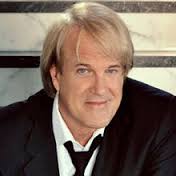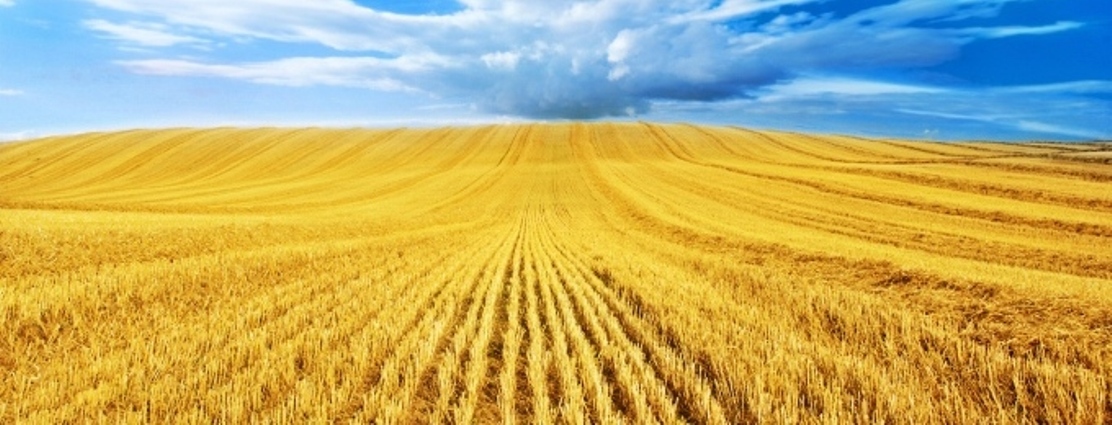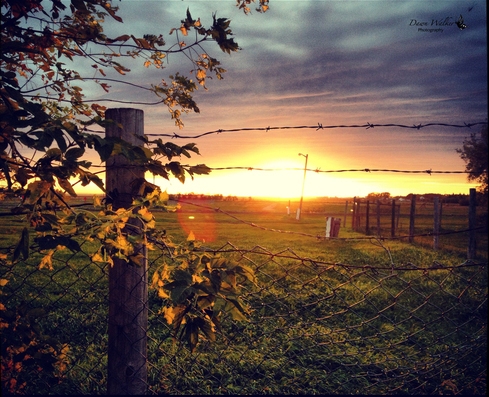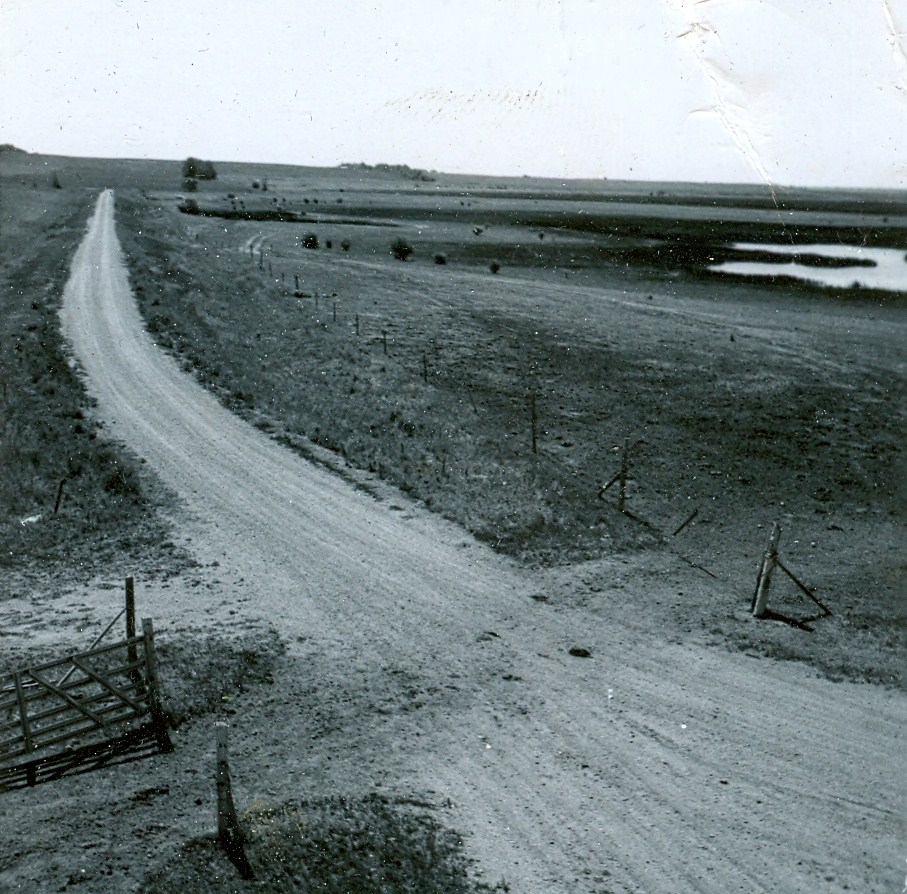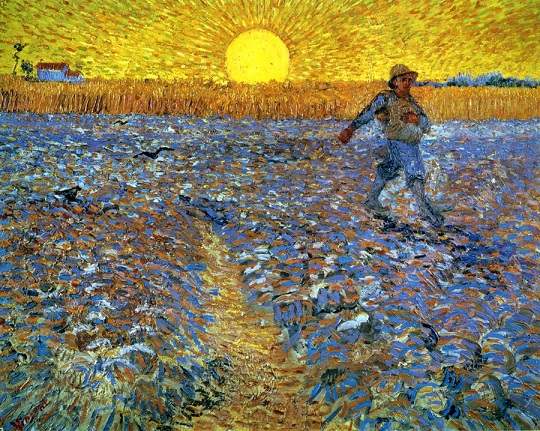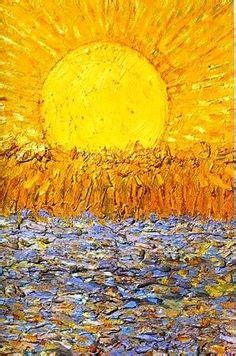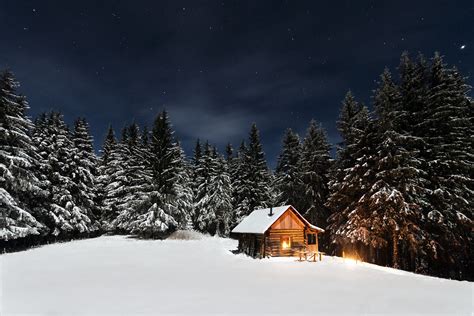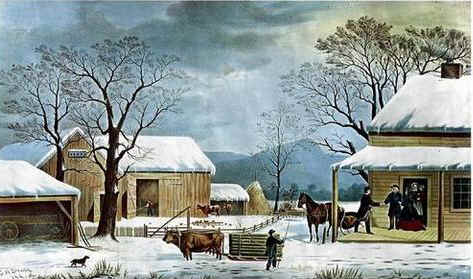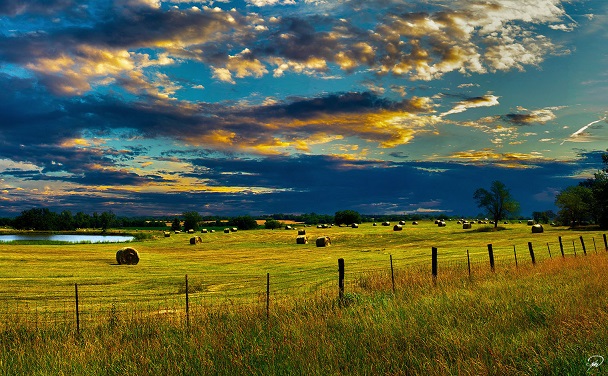|
home | what's new | other sites | contact | about |
|||||||||
|
Word Gems exploring self-realization, sacred personhood, and full humanity
Agriculture & Environment
"You are the sky of my stars and the sleep of my dreams." Walter Benton
"Life on a small farm might seem primitive, but by living such a life we become able to discover the Great Path. I believe that one who deeply respects his neighborhood and everyday world in which he lives will be shown the greatest of all worlds." Masanobu Fukuoka
John Ikerd: How Big Should a Small Farm Be? Chief Seattle: How can you buy or sell the sky? Colin Tudge: Enlightened Agriculture
my grandfather's farm, North Dakota
Thomas Jefferson, 1809: "No occupation is so delightful to me as the culture of the earth, and no culture comparable to that of the garden."
Rainer Maria Rilke: “If you will stay close to nature, to its simplicity, to the small things hardly noticeable, those things can unexpectedly become great and immeasurable.”
Deng Ming-Dao, 365 Tao: “It’s fun flying a kite, feeling the gigantic tug at the end of your line. Sometimes the wind is so strong that it will nearly lift you off the ground. When you harness the forces of nature, you harness something quite powerful. This is an example of the proper utilization of Tao. It is taking advantage of natural forces. It means accepting the way they work, and then finding a way to borrow their power.”
Editor’s note: I’d like to compare Deng Ming-Dao’s observation with the comment of Masanobu Fukuoka, the masthead quotation above. This latter thinker suggests that staying close to nature, observing and learning from it, what he calls "the Great Path,” will lead us to mystical insight, “the greatest of all worlds.” The literal meaning of Taoism is “The Way” or “The Teachings of The Way.” The essence of Taoism seems to be that of aligning oneself with nature, a coming into harmony with it, and thereby accessing its power. We might also bring to mind that, in the New Testament book of Acts, early Christianity was called “The Way.” So many of the parables of Jesus about “the kingdom of heaven" drew upon information from the natural world: “It’s like a farmer planting seeds,” he said, or “it’s like different kinds of soil,” or “like a wheat field filled with weeds.” We could make a long list of nature-agriculture references in the teachings of Jesus. Some of the great wisdom-instruction of history would have us mindful of what’s going on all around us in the natural world. If we do this, we’re told, the mysteries of heaven and earth just might open up to us. And it all starts in your back garden or on your farm.
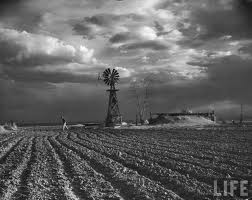 Thomas Jefferson: writing in 1809, after the distractions of public life had ceased, he confided to the painter Charles Wilson Peale: "I have often thought that if Heaven had given me choice of my position and calling, it should have been on a rich spot of earth, well watered, and near a good market for the productions of the garden. No occupation is so delightful to me as the culture of the earth, and no culture comparable to that of the garden."
Robert Baron, The Garden and Farm Books of Thomas Jefferson: "Monticello was a very special place to Thomas Jefferson. It was a place in which to explore the natural world, to exchange observations and ideas, to experiment with new plants and growing techniques and to study the natural sciences... [Jefferson] said 'The greatest service which can be rendered any country is to add a useful plant to its culture'... [Jefferson's garden] was a social place where events, ideas and feelings could be shared with his daughters, his grandchildren and his neighbors and friends." Editor's note: Jefferson's holdings included 13 farms, more than 10,000 acres, on which the third President experimented with a large number of assorted trees, grains, livestock, vegetables. He searched the world for new varieties of agricultural produce and brought them to America. For nearly 60 years Jefferson kept a journal of the goings-on of his farms and gardens: what was planted or given birth to, weather records, his recorded joy at the first cuttings of peas, etc. - all of this, annually transcribed, suggests that Jefferson was no mere passive "gentleman farmer" but one fully engaged in the dynamic world of plants, animals and the beautification of environment.
Thomas Jefferson, 1803, writing to David Williams: "... agriculture. It is the first in utility, and ought to be the first in respect. The same artificial means which have been used to produce a competition in learning, may be equally successful in restoring agriculture to its primary dignity in the eyes of men. It is a science of the very first order. It counts among it handmaids of the most respectable sciences, such as Chemistry, Natural Philosophy, Mechanics, Mathematics generally, Natural History, Botany. In every College and University, a professorship of agriculture, and the class of its students, might be honored as the first. Young men closing their academical education with this, as the crown of all other sciences, fascinated with its solid charms, and at a time when they are to choose an occupation, instead of crowding the other classes, would return to the farms of their fathers, their own, or those of others, and replenish and invigorate a calling, now languishing under contempt and oppression. The charitable schools, instead of storing their pupils with a lore which the present state of society does not call for, converted into schools of agriculture, might restore them to that branch qualified to enrich and honor themselves, and to increase the productions of the nation instead of consuming them." Thomas Jefferson, Dec. 20, 1787, writing to James Madison: "I think our governments will remain virtuous for many centuries; as long as they are chiefly agricultural." Thomas Jefferson, Oct. 28, 1785, writing to James Madison: "It is not too soon to provide by every possible means that as few as possible shall be without a little portion of land. The small landholders are the most precious part of a state."
John Steinbeck, Of Mice And Men Lennie said, "Tell how it's gonna be" ... "We gonna get a little place," George began. He reached in his side pocket and brought out Carlson's Luger. "Go on," said Lennie. "How's it gonna be. We gonna get a little place." "We'll have a cow," said George. "An' we'll have maybe a pig an' chickens ... an' down the flat we'll have a ... little piece of alfalfa --" "For the rabbits," Lennie shouted. "For the rabbits," George repeated. "And I get to tend the rabbits." An' you get to tend the rabbits." Lennie giggled with happiness... "Gonna do it soon." "Me an' you." ... "Ever'body gonna be nice to you..."
Editor's note: With the word "shouted" we viscerally feel Lennie's gushing excitement, so hopeful and child-like; within the context of the soon-following horrific, his exclamation ranks among the most disturbing in literature.
Will Durant, The Story of Civilization: "A people may possess ordered institutions, a lofty moral code, and even a flair for the minor forms of art, like the American Indians; and yet if it remains in the hunting stage, if it depends for its existence upon the precarious fortunes of the chase, it will never quite pass from barbarism to civilization... The first form of culture is agriculture. It is when man settles down to till the soil and lay up provisions for the uncertain future that he finds time and reason to be civilized. Within that little circle of security -- a reliable supply of water and food -- he builds huts, his temples and his schools; he invents productive tools, and domesticates the dog... at last himself. He learns to work with regularity and order, maintains a longer tenure of life, and transmits more completely than before the mental and moral heritage of his race." Abraham Lincoln: "The greatest fine art of the future will be the making of a comfortable living from a small piece of land." George Washington: "The life of the husbandman of all others is the most delectable... To see plants rise from the earth and flourish by the superior skill and bounty of the laborer fills a contemplative mind with ideas which are more easy to be conceived than expressed." Harvey Wiley, The Lure of the Land: "It is a fundamental error to suppose that farming is neither a business nor a profession... No other profession requires such a variety of learning, such an insight into Nature, such skill of a technical kind in order to be successful..." Calvin Coolidge: "There is no safer place of existence than the moderate-sized farm... the family that makes the farm an old-fashioned home with diversified crops, fruits and domestic animals sufficient to meet the household needs will still find agriculture one of the most satisfying forms of existence." M.G. Kains, Five Acres and Independence: "No fruit is easier to grow, quicker to yield a crop, surer of demand, or more likely to be profitable than the strawberry." John Streeter, The Fat of the Land: "If the general farmer will become an expert orchardist, he will find that year by year his ten acres of fruit will give him a larger profit than forty acres of grain land."
Cicero: "The diligent farmer plants trees, of which he himself will never see the fruit." John Milton: "Adam, well may we labour, still to dress This garden, still to tend plant, herb, and flower." Pliny the Elder: "Our fathers used to say that the master's eye was the best fertilizer." Jonathan Swift, Gulliver's Travels, voyage to Brobdingnag: "And he gave it for his opinion, 'that whoever could make two ears of corn, or two blades of grass, to grow upon a spot of ground where only one grew before, would deserve better of mankind, and do more essential service to his country, than the whole race of politicians put together.'" Virgil, Georgics: "E'en in mid-harvest, while the jocund swain Pluck'd from the brittle stalk the golden grain, Oft have I seen the war of winds contend, And prone on earth th' infuriate storm descend, Waste far and wide, and by the roots uptorn, The heavy harvest sweep through ether borne, As light straw and rapid stubble fly In dark'ning whirlwinds round the wintry sky."
"We trespassed, field to field; you, glad of my arms each time a fence challenged us; I,
always held you longer than it took to help you over." Walter Benton, This Is My Beloved
Cree Indian prophecy: "Only after the last tree has been cut down, only after the last river has been poisoned, only after the last fish has been caught, only then will you find that money cannot be eaten." Gandhi: "There's enough on this planet for everyone's needs but not for everyone's greed." Chief Seattle: "All things are connected like the blood that unites us, We did not weave the web of life. We are merely a strand in it. Whatever we do to the web, we do to ourselves." Lord Dunsany: "Humanity, let us say, is like people packed in a automobile which is traveling downhill without lights at a terrific speed and driven by a four-year-old child. The signposts along the way are all marked progress." Peter Fossel: "The soul of our quest for the simple life reflects a need to re-establish control of our lives." Thoreau: "Most of the luxuries, and many of the so-called comforts of life, are not only not indispensable, but positive hindrances to the elevation of mankind." Charles Wagner: "Aspire to simple living? That means, aspire to fulfill the highest human destiny." Booker T. Washington: "No race can prosper till it learns there is as much dignity in tilling a field as in writing a poem." Aristotle: "In all things of nature there is something of the marvelous."
Masanobu Fukuoka: "Life on a small farm might seem primitive, but by living such a life we become able to discover the Great Path. I believe that one who deeply respects his neighborhood and everyday world in which he lives will be shown the greatest of all worlds." Gandhi: "To forget how to dig the earth and tend the soil is to forget ourselves." The Lord of the Rings: "The one small garden of a free gardener was all his need and due, not a garden swollen to a realm; his own hands to use, not the hands of others to command." Anonymous: "Man, despite his artistic pretensions, his sophistication and many accomplishments, owes the fact of his existence to a six-inch layer of topsoil and the fact that it rains." John Muir: "Most people are on the world, not in it - have no conscious sympathy or relationship to anything about them - undiffused, separate, and rigidly alone like marbles of polished stone, touching, but separate." Marshall McLean: "Today the tyrant rules not by club or fist, but disguised as a market researcher, he shepherds his flocks in the ways of utility and comfort." Benjamin Mkapa, Tanzanian President: "Rich countries spend more than $300 billion a year on agricultural subsidies, an amount roughly equivalent to the entire gross domestic product of sub-Saharan Africa... The price of raw coffee beans has dropped by about 225 percent in the past 20 years, while the price of instant coffee in developing countries has jumped by 200 percent. As an example, a cup of coffee at fashionable restaurants in rich countries costs around $2, a figure almost double the average daily income of a Tanzanian farmer." Thomas Jefferson, to Benjamin Rush, 1800: "I view great cities as pestilential to the morals, the health and the liberties of man. True, they nourish some of the elegant arts; but the useful ones can thrive elsewhere; and less perfection in the others, with more health, virtue and freedom, would be my choice."
Thomas Jefferson, to George Washington, 1787: "Agriculture... is our wisest pursuit, because it will in the end contribute most to real wealth, good morals and happiness." Thomas Jefferson, to Jean Baptiste Say, 1815: "I had [once] persuaded myself that a nation distant as we are from the contentions of Europe, avoiding all offences to other powers and not over-hasty in resenting offence from them, doing justice to all, faithfully fulfilling the duties of neutrality, performing all offices of amity and administering to their interests by the benefits of our commerce - that such a nation, I say, might expect to live in peace and consider itself merely as a member of the great family of mankind; that in such case it might devote itself to whatever it could best produce, secure of a peaceable exchange of surplus for what could be more advantageously furnished by others, as takes place between one country and another of France. But experience has shown that continued peace depends not merely on our own justice and prudence but on that of others also; that when forced into war, the interception of exchanges which must be made across a wide ocean becomes a powerful weapon in the hands of an enemy domineering over that element, and to the distresses of war adds the want of all those necessaries for which we have permitted ourselves to be dependent on others, even arms and clothing. This fact, therefore, solves the question by reducing it to its ultimate form, whether profit or preservation is the first interest of a State? We are consequently become manufacturers to a degree incredible to those who do not see it and who only consider the short period of time during which we [had] been driven to them by the suicidal policy of England." Abraham Lincoln, Sept. 30, 1859, address before the Wisconsin State Agricultural Society: "Every blade of grass is a study; and to produce two, where there was but one, is both a profit and a pleasure... This leads to the further reflection, that no other human occupation opens so wide a field for the profitable and agreeable combination of labor with cultivated thought, as agriculture. I know of nothing so pleasant to the mind, as the discovery of anything which is at once new and valuable -- nothing which so lightens and sweetens toil, as the hopeful pursuit of such discovery. And how vast, and how varied a field is agriculture, for such discovery. The mind, already trained to thought, in the country school, or higher school, cannot fail to find there an exhaustless source of profitable enjoyment."
my father's farm, North Dakota
Wendell Berry, The Unsettling of America: "Some prominent agricultural economists are still finding it possible to pretend that the only issues [concerning farming] are economic ... I recently attended a meeting at which an agricultural economist argued that there is no essential difference between owning and renting a farm. A farmer stood up ... and replied: 'Professor, I don't think our ancestors came to America in order to rent a farm.'" Alexis de Tocqueville, On Democracy: "It is difficult to describe the rapacity with which the American rushes forward to secure the immense booty which fortune proffers to him... They early broke the ties that bound them to their natal earth, and they have contracted no fresh ones on the way." Wendell Berry, The Unsettling of America: "That one American farmer can now feed himself and 56 others may be ... a triumph of technology; but [not] a triumph of agriculture and of culture." Ralph Beer, In These Hills: "Long about the first of February a certain sense of futility creeps in -- you start talking about selling, the ranch, or, failing that, giving it to someone you can't stand."
Lee Klancher, Tractor In The Pasture: "Next time you see an old piece of equipment at rest on a fencerow ... stop for a moment ... maybe the Universe will whisper in your ear [regarding the mutability of life] ..." Gary Comstock, Editor, Is There A Moral Obligation To Save The Family Farm?: "Family Farms Are Not Lost, They Are Stolen: This destruction of family farms and deterioration of our environment is not the result of 'natural economic forces.' It is not the result of good policies gone bad. Today's farm crisis is rooted in the conscious dismantling of the cost-effective, prosperity-generating federal farm policies initiated during the 1930s. In contrast, farm programs of the last three decades have been designed to enforce low farm prices. These policies designed to ensure cheap raw materials here and abroad for multinational, monopoly grain traders and food processors are rapidly destroying family farms and rural communities throughout our nation... [Government manipulation of market forces] relates to the especially devastating impact of low farm prices on the Third World. Cheap imports from the US make it hard for Third World farmers to compete. They are discouraged from producing food for domestic consumption and are forced to grow more nonfood export cash crops. Increasing dependency on food imports is increasing hunger in these countries... Those of us in the US who are concerned about ending hunger must first take a look at what our cheap raw material prices are doing to farmers and hungry people around the globe. One of the best ways to end hunger is to increase the self-sufficiency of farmers everywhere. This means giving farmers a reasonable profit in the US and abroad. Raising our prices will not translate into lower export sales; other countries will follow suit, raising their prices as well."
Henry Hazlitt: "While certain public policies would in the long run benefit everybody, other policies would benefit one group only at the expense of all other groups. The group that would benefit by such policies ... will argue for them plausibly and persistently. It will hire the best buyable minds to devote their whole time to presenting its case. And it will finally either convince the general public that its case is sound, or so befuddle it that clear thinking on the subject becomes next to impossible. In addition to these endless pleadings of self-interest, there is a second main factor that spawns new economic fallacies every day. This is the persistent tendency of men to see only the immediate effects of a given policy, or its effects only on a special group, and to neglect to inquire what the long-run effects of that policy will be not only on that special group but on all groups. It is the fallacy of overlooking secondary consequences. In this lies almost the whole difference between good economics and bad." Australian aboriginal proverb: referring to the earth's fragility: "Touch the earth lightly." Major Dick Winters, June 6, 1944, D-Day, the evening of that first incredible day of the liberation of Europe as depicted in the HBO movie series, Band of Brothers, and based on his own writings: "That night I took time to thank God for seeing me through the Day of Days; and I prayed that I would make it through 'D+1' - and if somehow I managed to get home again I promised God and myself that I would find a quiet piece of land someplace and spend the rest of my life in peace."
Currier & Ives, Home for Thanksgiving
|
|||||||||
|
|
